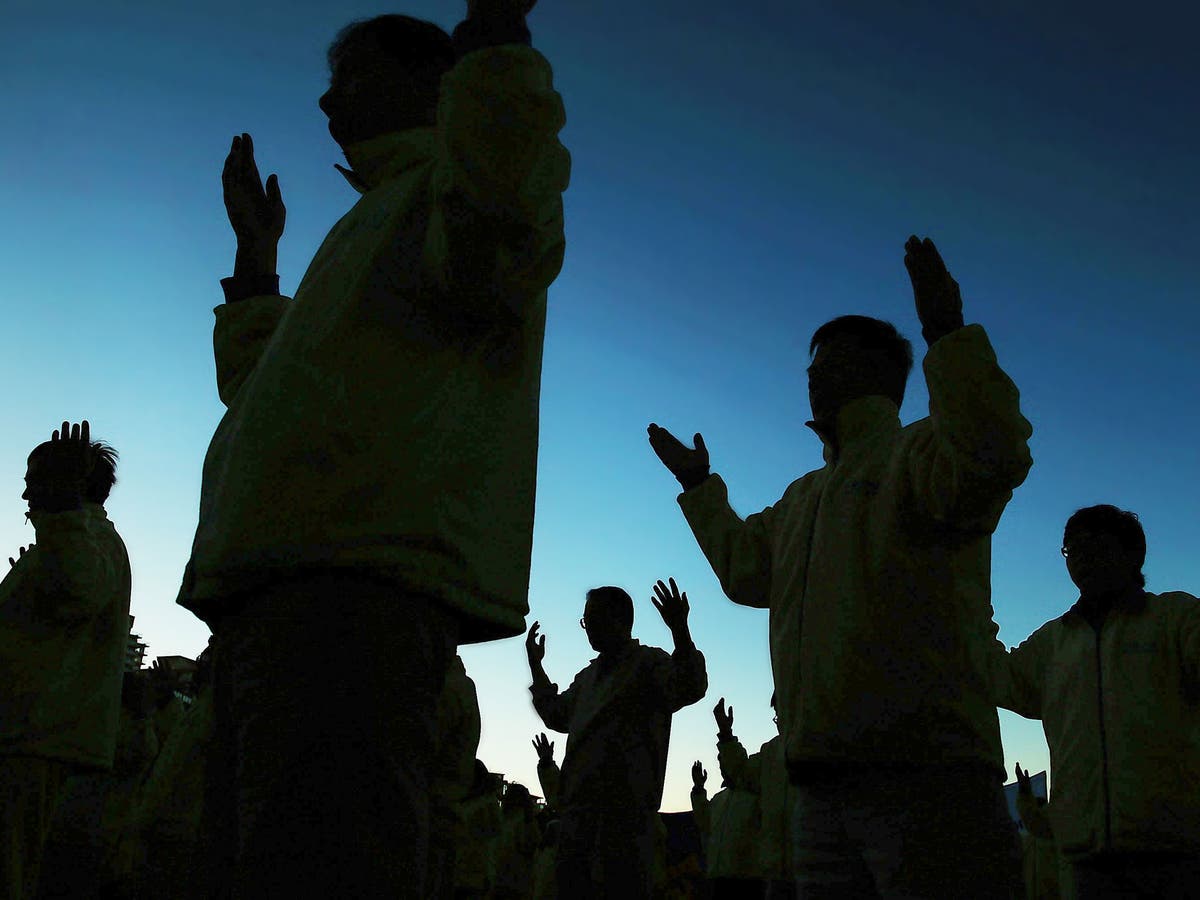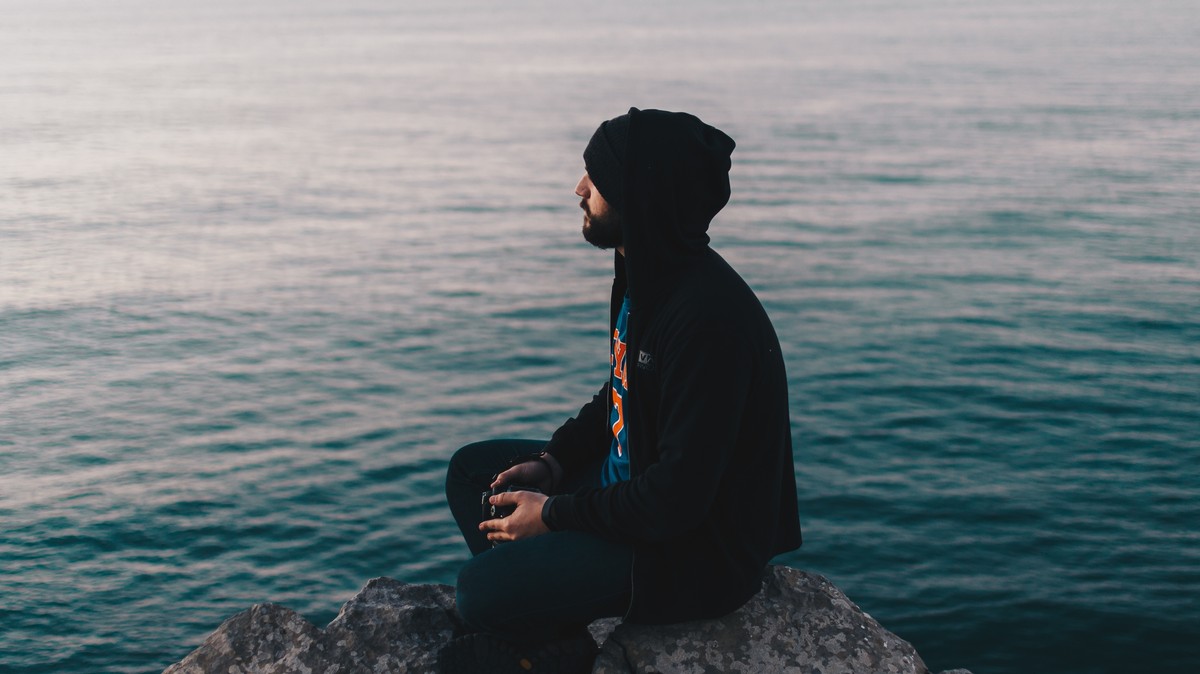Zitat For Britton, the takeaway was that adverse effects routinely occur even under optimal conditions, with healthy people meditating correctly under supervision. “It’s so easy to assign a latent vulnerability after the fact,” Britton said, “but we are seeing people who really had no indicators.”
Die Studie, die Leute ohne Vorerkrankung beinhaltet.
Zitat Reports of disturbing experiences during meditation appear in a number of early Buddhist writings. In the Theravada tradition, from which S. N. Goenka’s system derives, meditators are said to experience “corruptions of insight” that, from the vantage of modern clinical psychology, resemble psychosomatic ailments, including manic bliss states, gastrointestinal issues, and visual hallucinations.
[Report] Lost in Thought | Harper's Magazine
Warum nur Meditation reicht, psychotische Schübe zu veranlassen, in der Richtung kann man kurzer Suche auch noch mehr Hinweise finden.
Zitat I put the same question to Matcheri Keshavan, a neuroscientist and psychiatrist at Harvard Medical School. He thought it was possible. There are reliable ways to induce psychosis and other disturbances in a healthy subject—via drugs, sleep deprivation, and prolonged confinement or isolation. “If you deprive the brain of normal inputs—through sensory or social deprivation—that can produce psychosis,” he said. “And you can think of prolonged meditation as a form of deprivation.” The brain is accustomed to a certain amount of activity. When you’re sitting motionless with your eyes closed for ten or more hours a day, he said, neurons can start firing on their own, unprompted by external stimulation, “and this might lead to unusual phenomena, which we call psychosis.”
Zitat EXTENSIVE MEDITATION CAN CAUSE DEPERSONALISATION
Studies show that meditation has been shown to cause Depersonalisation/derealisation, which is a strange, and frankly, frightening experience, where life does not feel “real” and takes on a very dream-like quality. It’s like being awake, only you do not feel awake, and you cannot do magical things like ride dinosaurs and surf clouds as you can in the actual dream world.
Sadly, some meditation retreats are irresponsibly intense and do not have much in the way of “integration” back into reality.
EXTENSIVE MEDITATION CAN CAUSE PSYCHOTIC SYMPTOMS
There have been numerous reports of adverse mental health effects lasting for years following attendance at a meditation retreat.
Nach 2 Tagen Vipassana Retreat:
Zitat As an instructor in Mindfulness-Based Stress Reduction (MBSR), I spent four years teaching meditation as a full-time job. A longtime meditator, I have logged roughly 4,000 hours of practice over 10 years, including more than 100 days on roughly a dozen silent meditation retreats. I’m extremely knowledgeable of both Buddhist and secular frameworks of meditation, have read countless books on the subject, and have taken instruction from numerous renowned Western meditation teachers.
In the months after the retreat, I suffered from symptoms diagnosed by a therapist as post-traumatic stress disorder. I frequently experienced involuntary convulsions and simple tasks like cooking a meal induced panic attacks. I was occasionally so overwhelmed by my bodily sensations that I was unable to speak, and sometimes had problems differentiating myself from my surroundings.

Zitat I looked further into the literature. In 1992, David Shapiro, a professor at UCLA Irvine, published an article about the effects of meditation retreats. After examining 27 people with different levels of meditation experience, he found 63 per cent of them had suffered at least one negative effect and seven per cent profoundly adverse effects.
The negative effects included anxiety, panic, depression, pain, confusion and disorientation. But perhaps only the least experienced felt them – and might several days of meditation not overwhelm those who were relatively new to the practice? The answer was no. When Shapiro divided the larger group into those with lesser and greater experience, there were no differences: all had an equal number of adverse experiences. And an earlier study had arrived at a similar, but even more surprising conclusion: those with more experience also had considerably more adverse effects than the beginners.
https://onlinelibrary.wiley.com/doi/full/10.1111/acps.13225
Zitat We found that the occurrence of AEs during or after meditation practices is not uncommon, and may occur in individuals with no previous history of mental health problems. These results are relevant both for practitioners and clinicians, and contribute to a balanced perspective of meditation as a practice that may lead to both positive and negative outcomes.
Dogens radikaler Ansatz, den auch Muho vertritt.
GAKUDÔYÔJINSHÛ
"
Die Übung des Zen und das Lernen des Weges sind die eine große Sache deines Lebens. Sei nicht lax und lau dabei. In alter Zeit hackte sich einer den Arm, ein anderer die Finger ab. Dies sind großartige Spuren aus dem alten China. Buddha hinterließ in alter Zeit durch seinen Verzicht auf Palast und Reich ein Muster der Übung des Weges.
Heutzutage sagen die Leute, wir sollten das üben, was leicht zu üben ist. Nichts könnte verkehrter sein, weit verfehlt es den Buddhaweg. Wenn du deine Übung auf nur eine einzige Sache ausrichtest, wird dir selbst das Liegen mühselig werden."
Zitat Salguero said research done in 2020 found that 67% to 73% of meditators experience what they call "unpleasant experiences." Another study in 2021 reported that 58% of meditators have "meditation-related adverse effects."
Zitat References to meditation sickness have been around for centuries, appearing in medieval Chinese literature as early as 454 C.E. But it was not until recently that medical practitioners started to define what it is.

Zitat It is not uncommon for various Buddhist masters, such as Guifeng Zongmi (780-841), a celebrated Zen master, to criticize excessive focus on meditation and achieving “inner stillness” (ningji). In Is Mindfulness Buddhist?, Robert Sharf professor of Buddhist studies at UC Berkeley, writes that Buddhist masters, like Zongmi, warned about disengagement from the world and used the term “meditation sickness” (chanbing) to criticize practices that were detrimental, mostly those techniques that emphasized inner stillness.1
Eastern masters like Zongmi, continues Sharf, were critical of practices that cultivated a non-critical or non-analytical presentness. In other words, what in today’s parlance we might call “zoning out”. We are not referring here to ordinary daydreaming or being lost in thought. Rather “meditation sickness” is a potentially harmful, even psychotic, reaction to too much immersion in meditation practice.
Zen Meister Hakuins Meditation Sickness nach seiner Erleuchtung


Zitat The Śūraṅgama Sūtra—a classic text of Mahāyāna Buddhism—identifies fifty deceptive or illusory experiences (skandha-māras) that are associated primarily, though not exclusively, with the practice of concentration (samādhi). The Sūtra particularly warns about pleasant experiences that lead the meditator into a false sense of spiritual progress, which results in misguided thinking and conduct.6
Likewise, “in Theravāda Buddhist traditions, progress in the practice of meditation is expected to lead to transient experiences called “corruptions of insight” (vipassanā-upakkilesā) on account of meditators’ tendency to confuse these blissful and euphoric states for genuine insight” 7.
Contemporary accounts report monks becoming “mentally unstable” in the wake of such states 8. Other stages of practice, in particular some of the “insight knowledges” (vipassanā-ñāṇa), are presented as being particularly challenging, especially in modern Asian sources 9.
Zitat “Meditation sickness” has been identified by various Eastern Buddhist traditions, and is sometimes also called “Zen sickness”, “falling into emptiness”, or “lung” (Tibetan rlung; pronounced loong).
Zitat Greenland said that unlike teachers 30 years ago, her current teacher, Yongey Mingyur Rinpoche, is forthcoming and tells people “right up front” that “they’ll be dealing with big emotions” in certain stages of practice, advising students to open their eyes, take breaks, get physical exercise, or pause from practice if necessary.
Zitat Finally, some meditators may fall into the trap of remaking themselves as a ‘spiritual person’, essentially another ego-driven expression of identity and self-perception.
In this way, the act of meditation becomes more an act of image crafting and gaining social kudos from engaging in the practice.
The emergence of an increasing number of meditation communities may foster such hidden elements of competition as and the scoring of social points through dedicated practice.
Zitat Additionally – these adverse effects can be more prevalent in longer-term meditators (although note that this study only included 27 participants). This finding also replicates Otis’s earlier finding that the adverse-effects of meditation (Transcendental Meditation) were stronger in 18-month meditators than in 3-6 month meditators, and even teacher trainers of TM with an average of 46.7 months practice, continued to report the same adverse effects. In this study, 75% of subjects with 105 months meditation experience reported adverse effects, compared to 40% of those with 16.7 months experience.
Zitat Britton and her team began visiting retreats, talking to the people who ran them, and asking about the difficulties they’d seen. “Every meditation center we went to had at least a dozen horror stories,” she said. Psychotic breaks and cognitive impairments were common; they were often temporary but sometimes lasted years. “Practicing letting go of concepts,” one meditator told Britton, “was sabotaging my mind’s ability to lay down new memories and reinforce old memories of simple things, like what words mean, what colors mean.” Meditators also reported diminished emotions, both negative and positive. “I had two young children,” another meditator said. “I couldn’t feel anything about them. I went through all the routines, you know: the bedtime routine, getting them ready and kissing them and all of that stuff, but there was no emotional connection. It was like I was dead.”
Zitat Britton realized that she had experienced some of the symptoms that her interview subjects were describing. “It took me three years of trauma training to realize, oh, that’s dissociation. And I hadn’t realized it because if you can sit for long periods of time and not feel any pain and not have any thoughts, most meditation teachers are going to say that you’re doing great,” she said. “But this was different. I felt like I was living in a parallel dimension from the rest of the world, not connected at all.” She recalled one experience she’d had while still in graduate school. “I was meditating outside, and I felt something shift. I was having a really hard time, and then everything just clicked.” Suddenly everything seemed fine. “Now I know that’s a red flag, when someone goes from having intense negative emotions to instantly feeling fine, as if someone just flipped a switch.”
Zitat In 2017, Britton and her team published their findings in PLOS One, a prominent scientific journal. The report presented a taxonomy of “meditation-related difficulties,” including anxiety and panic, traumatic flashbacks, visual and auditory hallucinations, loss of conceptual meaning structures, non-referential fear, affective flattening, involuntary movements, and distressing changes in feelings of self. Some of the study participants were new to meditation, but nearly half had at least ten thousand hours of practice. The majority of the sample—forty-three out of sixty meditators representing Theravada, Zen, and Tibetan traditions—had experienced moderate to severe impairment in their day-to-day functioning. Ten had required inpatient hospitalization. “Hearing those stories, one after the other, I was like, wow, there’s a lot of suffering here,” Britton said. “That study changed everyone who worked on it. I just couldn’t be the evangelist that I had been.”
Some of the individuals in the study had preexisting psychiatric conditions, but most did not. For Britton, the takeaway was that adverse effects routinely occur even under optimal conditions, with healthy people meditating correctly under supervision. “It’s so easy to assign a latent vulnerability after the fact,” Britton said, “but we are seeing people who really had no indicators.”
Zitat Monks in the Zen tradition may encounter “diabolical phenomena,” which are characterized by involuntary movements and frightening mental imagery. Chinese and Japanese Zen masters are said to succumb to a “meditation sickness” in which the afflicted become disoriented and have trouble regulating their body temperatures and energy levels. Buddhist monastics in Tibet may develop “wind illness,” the symptoms of which include confusion and agitation; according to a twelfth-century Buddhist medical treatise, the disorder is caused by the “three poisons of attachment, hatred, and closed-mindedness.”
Zitat linicians and researchers simply did not report the negative consequences of meditation, but it was more likely that the meditators themselves did not talk about it: many who encounter difficulties during or after their practice may feel they're doing something wrong, or even that their distress is part of the process and will eventually pass. That was the case with Miss X, who eventually refused continuous treatment, explaining that her mania was just a release of blocked energy from years of not dealing with her emotions adequately. And many meditators thinking like Miss X could go towards explaining why negative reports didn't make it into journals – because the effects were seen as mere stones on the road to peace or spiritual attainment.
However, a number of Western Buddhists are aware that not all is plain sailing with meditation; and they have even given a name to the emotional difficulties that arise – the "dark night" – borrowing the phrase coined by the 16th-century Christian mystic St John of the Cross to describe an advanced stage of prayer and contemplation characterised by an emotional dryness, in which the subject feels abandoned by God. Buddhists, in principle, ought not to feel abandoned by God, but a Buddhist blog on the subject is riddled with turmoil:
"Nine years on and off of periods of deep depression, angst, anxiety and misery"; "there was a nausea that kept coming up, terrible sadness, aches and pain"; "I've had one pretty intense dark night, it lasted for nine months, included misery, despair, panic attacks… loneliness, auditory hallucinations, mild paranoia, treating my friends and family badly, long episodes of nostalgia and regret, and obsessive thoughts (usually about death)".
Willoughby Britton, a neuroscientist and psychiatrist at Brown University, is now trying to map what she calls "the dark side of Dharma", an interest that arose from witnessing two people being hospitalised after intense meditation practice, together with her own experience after a retreat in which she felt an unimaginable terror. And reading through the classical Buddhist literature, she realised that such experiences are often mentioned as common stages of meditation.
Zitat That answer likely feels cruel to the family of Megan Vogt. Vogt, a 25-year-old Pennsylvania woman with no history of mental illness besides anxiety, committed suicide in 2017 in the aftermath of a 10-day Vipassana retreat. According to media reports, she left the retreat in a psychosis, barely recognizable to her family. On the way home from the retreat center, she tried to commit suicide by jumping out of her car and eventually spent time in a psychiatric ward.
Ten weeks later, she jumped off a bridge to her death.
Zitat Spirit Rock Meditation Center, widely viewed as the mecca of American Buddhism, hosts scores of silent meditation retreats each year. On its website, there are reminders not to bring scented soap due to allergies, articles touting the benefits of meditation, and even a recipe for the gluten-free almond cupcakes served in the center’s acclaimed kitchen. Yet there’s not a single word about a fact every prospective meditator deserves to know: meditation can harm you
3
.
Vipassana International, the meditation organization that Britton says triggers the most adverse effects, flat-out denies meditation ever goes bad. With 13 retreat centers in the United States and 207 across the globe, Vipassana International likely serves more meditators than any other organization in the world. On its website, it specifically answers the question of whether or not Vipassana meditation can “make you mentally unbalanced.”
The answer given: “No, Vipassana teaches you to be aware and equanimous, that is, balanced, despite all the ups and downs of life.
Zitat She said that many of the leading figures in the world of mindfulness meditation have had experiences like mine, but they just don’t talk about them. It’s an open secret of sorts.


 LG.
LG.

